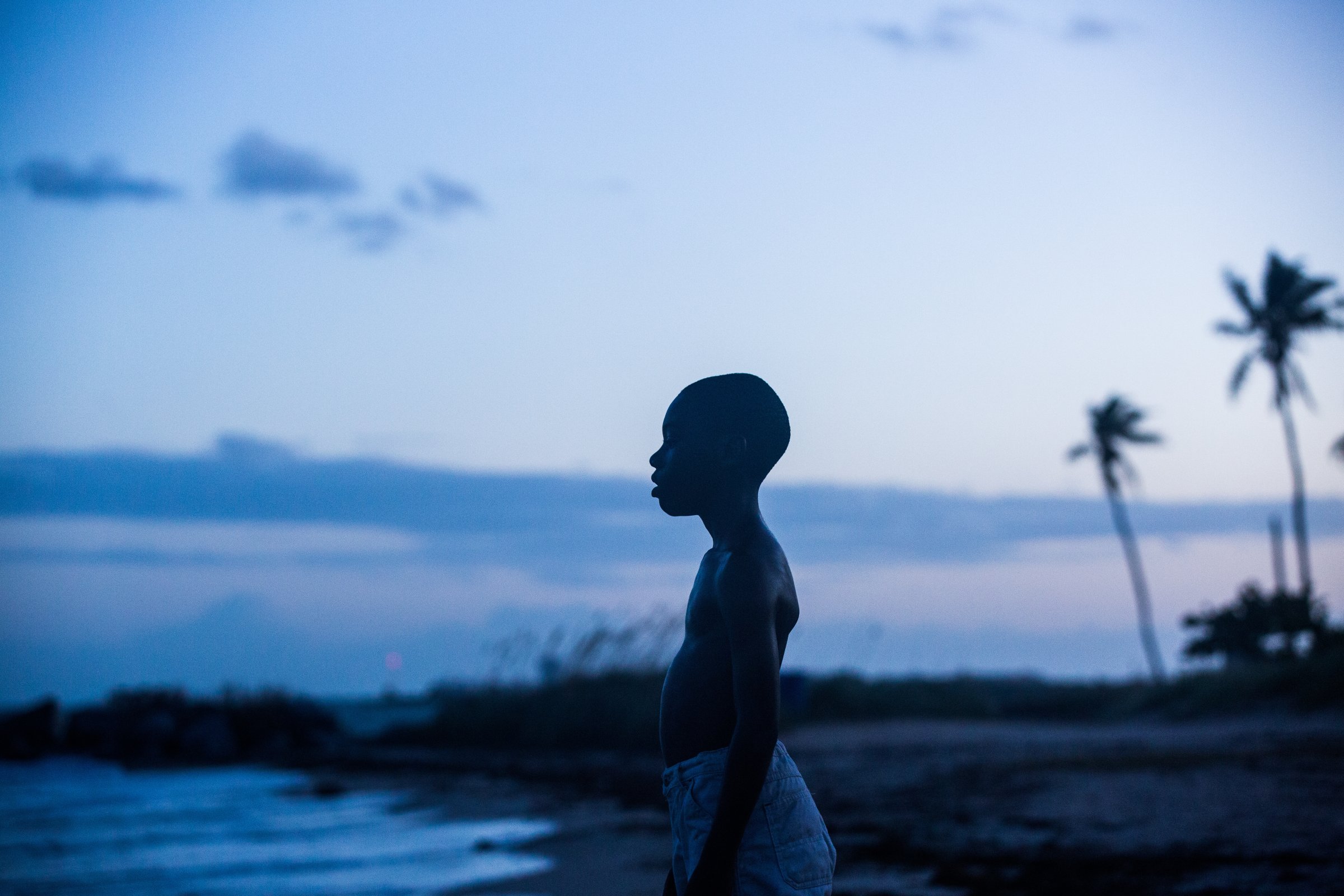
The best film at the Toronto International Film Festival this year is also the most delicate, such a calm yet precise piece of filmmaking that you’re barely prepared for its shimmering, quietly sensational ending. Barry Jenkins’ Moonlight—which Jenkins adapted from a story by playwright Tarell McCraney—is a coming-of-age movie, and a love story, that leaves you feeling both stripped bare and restored, slightly better prepared to step out and face the world of people around you, with all the confounding challenges they present. There’s not much more you can ask from a movie.
Three actors play the lead character during the course of Moonlight: A new, and marvelous, child actor named Alex R. Hibbert plays Little, an almost incongruously scrawny Miami kid who’s picked on mercilessly by his classmates. With these mini thugs in pursuit, he dashes into a boarded-up house used as a drug hangout. A dealer named Juan (Mahershala Ali), the kind of guy who looks threatening to bad dudes but is radiantly kind to innocents like Little, plucks him out and brings him home for a good meal (Janelle Monae plays his smart-sassy girlfriend, Theresa). Juan returns Little to his mother, Paula (the always terrific Naomie Harris) the next morning.
Little’s relationship with his mother is a troubled one, and adolescence doesn’t improve it. As a teenager, Little becomes known by his real name, Chiron (now played by Ashton Sanders): He’s taller and, if possible, even thinner, as if he were stretching toward a manhood he isn’t nearly ready for. And he still has very few friends, though there is one, Kevin (Jharrel Jerome), who shows him a kind of rough-and-tumble kindness that segues into something deeper and more meaningful, a romantic and sexual reverie that neither kid can quite deal with. This isn’t the time or the place or the age for it: The young men around them are judged by how tough they are, and Chiron isn’t tough at all. When he learns to be, your heart sinks—but it’s also clear there’s no other way for him to survive.
As an adult, Chiron, who now goes by the name Black (Trevante Rhodes), is barely recognizable—he’s beefed-up and closed off, the kind of guy who doesn’t let anyone mess with him, or get to him. He now lives in Atlanta, and he and his mother are finally brokering some sort of peace. And one day Kevin (now played by André Holland, of The Knick) calls him out of the blue. What happens between the two men is so subtle and marvelous to watch that you feel drawn into an invisible but intense embrace. Any defenses you might be hanging onto—and who doesn’t have them?—seem to dissolve along with Black’s. The spell this movie casts is that strong.
This is Jenkins’ first feature since his 2008 debut Medicine for Melancholy (which also premiered at TIFF that year), a hypnotic, perceptive film about a young man and woman of color slipping into a tentative relationship in that historically pretty damn white city, San Francisco. Many who saw Medicine for Melancholy, including me, have been waiting for a follow-up. Moonlight exceeded my expectations, and I can’t recall the last time I saw so many sterling performances—some by little-known or as yet unknown actors—in one picture. Their glow fulfills every promise of the movie’s name.
This is my last full day in Toronto, and as always, the pileup of movies I didn’t get a chance to write about is overwhelming. A few off-the-cuff favorites: William Oldroyd’s chilly, elegant and grimly funny Lady Macbeth, in which a young woman forced into an arranged marriage calmly assumes control of everything and everyone around her; Onur Tukel’s weird, wild, invigorating satire, Catfight, in which Sandra Oh and Anne Heche beat the crap out of each other in a series of bone-cracking fight sequences that aren’t for the faint of heart; Adam Leon’s delightful New York-set romantic caper Tramps; and Kasper Collin’s superb documentary I Called Him Morgan, about the turbulent but profound relationship between great bop trumpeter Lee Morgan and his wife, Helen, who shot him dead in a New York City club in 1972, a crime of passion with heartbreaking consequences—because love, like the greatest of music, is often unpredictable.
More Must-Reads From TIME
- The 100 Most Influential People of 2024
- Coco Gauff Is Playing for Herself Now
- Scenes From Pro-Palestinian Encampments Across U.S. Universities
- 6 Compliments That Land Every Time
- If You're Dating Right Now , You're Brave: Column
- The AI That Could Heal a Divided Internet
- Fallout Is a Brilliant Model for the Future of Video Game Adaptations
- Want Weekly Recs on What to Watch, Read, and More? Sign Up for Worth Your Time
Contact us at letters@time.com